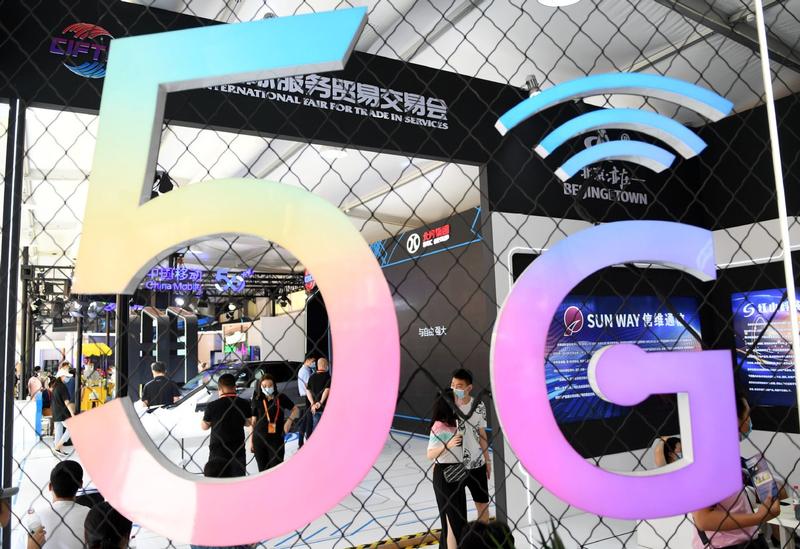 People visit the exhibition area of 5G communication at the 2020 China International Fair for Trade in Services in Beijing on Sept 5, 2020. (PHOTO / XINHUA)
People visit the exhibition area of 5G communication at the 2020 China International Fair for Trade in Services in Beijing on Sept 5, 2020. (PHOTO / XINHUA)
China is embracing new growth momentum in the industrial internet, as the country strives to gain a beachhead in the next generation of industrial development globally, the top industry regulator, government officials and experts said on Sunday.
Such breakthroughs are in line with President Xi Jinping's call to enhance the innovative capability of the industrial internet, and push forward integration between industrialization and informatization
"China's industrial internet sector is entering the fast lane. A slew of new breakthroughs, new models and new applications have emerged," Sui Jing, deputy head of information and telecommunications at the Ministry of Industry and Information Technology, said at the 2020 World Industrial Internet Conference which opened on Sunday in Qingdao, Shandong province.
READ MORE: MNCs bullish on Chinese internet healthcare sector
Sui said that China has already nurtured over 70 industrial internet platforms that have regional influence with related applications covering over 30 key industries across the country. More than 350,000 industrial enterprises are connected to cloud platforms, she added.
Such breakthroughs are in line with President Xi Jinping's call to enhance the innovative capability of the industrial internet, and push forward integration between industrialization and informatization, she said.
The industrial internet, also known as the industrial internet of things, is a key sector for the country's new infrastructure construction. It refers to the broader adoption of advanced technologies such as next-generation wireless networks, big data, artificial intelligence and the internet of things.
"China's industrial internet is ushering in new growth opportunities amid the industrial revolution globally. It has a potential that goes beyond the imagination, which not only promotes the upgrading of manufacturing industry but also determines whether China can lead the next round of the technological and industrial revolution worldwide," said Wang Qingxian, Party secretary of Qingdao.
At the two-day conference, Wang shared his understanding of the industrial internet, saying that "the industrial internet is not just an instrument, but also an ecosystem that connects all elements of the industrial economy, including the industry chain, the value chain, research and development, procurement, production and consumption".
With 340 million users and 3.9 million ecosystem partners, the platform has emerged as one of the top industrial internet platforms in the world
"While the industrial internet has just kicked off on the global stage, China's industrial internet platforms, represented by Qingdao's COSMOPlat, are coming to the forefront of the industrial internet and have led the world in terms of applications," he said.
COSMOPlat, an industrial internet platform developed by home appliance giant Haier Group, is a large-scale customization platform that allows users to engage in many stages of the industrial process from design to sales.
With 340 million users and 3.9 million ecosystem partners, the platform has emerged as one of the top industrial internet platforms in the world.
Wang noted that during the COVID-19 pandemic, Haier leveraged the COSMOPlat platform to help Shanxi province build a production line of disposable surgical masks within only four days and was able to manufacture 100,000 masks each day on average.
ALSO READ: Internet access a boon for remote herders keeping eyes on flocks
"China is betting big on the industrial IoT to increase productivity and drive efficiencies by streamlining and automating manufacturing processes via internet connectivity. Backed by positive government support, China is set to become the world's leader," said Alex Sinclair, chief technology officer of the Global System for Mobile Communications Association.
China has called for new infrastructure development, including 5G, artificial intelligence and the industrial internet to offset the economic impact of the pandemic and boost sustainable growth.
According to the GSMA, China is poised to lead the global industrial IoT market. There will be 13.8 billion such connections globally by 2025 and China will account for approximately 4.1 billion of them, accounting for a third of the global market.


